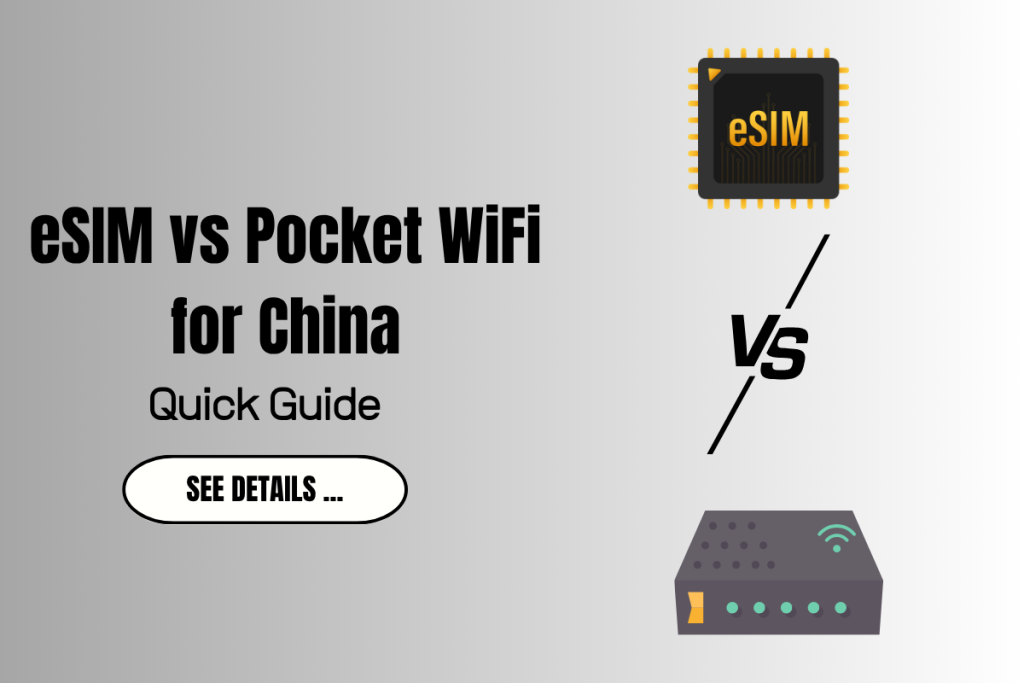When planning your trip to China, reliable internet access is essential for navigation, translation, and staying connected with family and friends. The two main options—eSIM vs Pocket WiFi for China—offer different advantages depending on your travel style and connectivity needs. This guide compares these solutions to help you make the right choice for your specific situation, ensuring seamless access to both Chinese and international websites throughout your journey.

I. What Is an eSIM and How Does It Work in China?
An eSIM is a digital SIM built into your device that activates via QR code, requiring no physical card. For China travelers, specialized eSIMs offer crucial benefits:
- Include built-in VPN to bypass the Great Firewall
- Access blocked sites like Google and WhatsApp
- Activate before arrival for immediate connection
- No need for physical SIM swapping or store visits
To use one, ensure your device is eSIM compatible and unlocked, then purchase a China-specific plan with integrated VPN capabilities from providers.
II. What Is Pocket WiFi and How Does It Work in China?
Pocket WiFi is a portable router creating a personal WiFi hotspot using mobile data networks. In China, these devices offer travelers convenient internet access:
- Connects multiple devices (up to 10) to Chinese mobile networks
- Requires daily charging (6-12 hours battery life)
- Must be reserved ahead and picked up at airports/hotels
- Does NOT include VPN features – install a separate VPN before arrival to access blocked sites like Google and Facebook
This solution works well for families or groups traveling together who need internet access without dealing with individual Chinese SIM cards and their verification requirements.
III. Comparison: eSIM vs Pocket WiFi
When visiting China, staying connected is essential. Both eSIM and Pocket WiFi can keep you online, but they differ significantly in cost, convenience, and coverage.
Cost Comparison
eSIMs from Chinaesim offer straightforward, economical pricing without hidden fees. The standard version starts at $13.90 (No VPN Required) and works in Hong Kong and Macau. There are no deposits or return charges to worry about.
Pocket WiFi typically costs $5-$10/day for the base rental, plus a security deposit between $50-$150. You’ll also need to watch for hidden charges like shipping fees, damage penalties, and costs for late returns – all added to your travel budget.
Convenience Factors
eSIM integration is seamless and maintenance-free. You’ll receive a QR code via email to scan before your trip, and it activates automatically upon arrival in China. There’s nothing extra to carry, charge, or potentially lose.
Pocket WiFi requires managing an additional device:
- Must pick up and return to specific locations
- Needs daily charging and careful handling
- Battery life limitations, especially with multiple connected devices
Coverage Comparison
Both options provide reliable connectivity in most areas. eSIMs connect directly to major Chinese networks like China Mobile or Smartone, offering consistent 4G/5G speeds across the country. The TikTok-enabled version extends coverage to Hong Kong and Macau, while standard eSIMs work only in mainland China.
Pocket WiFi devices may struggle in rural areas or on high-speed trains, and typically only work in mainland China without additional fees.
For most travelers, eSIMs deliver better overall value with less hassle while providing comparable or superior connectivity.
IV. Who Should Choose eSIM and Pocket WiFi?
Your travel style and tech preferences should guide your connectivity choice in China. This comparison helps you quickly determine which option better suits your needs:
| Choose eSIM if you are: | Choose Pocket WiFi if you are: |
| • Solo traveler (no extra device to carry) | • Family/group sharing one connection |
| • Digital nomad needing work access | • Staying long-term (over a month) |
| • Short-term visitor (1-30 days) | • Less tech-savvy (simpler setup) |
| • Need instant access to blocked sites | • Connecting multiple non-eSIM devices |
China-specific eSIMs from Chinaesim include built-in VPN functionality Hong Kong/Macau coverage.
Pocket WiFi requires carrying and charging an extra device plus managing pickup/return, but allows multiple device connections with a single rental.